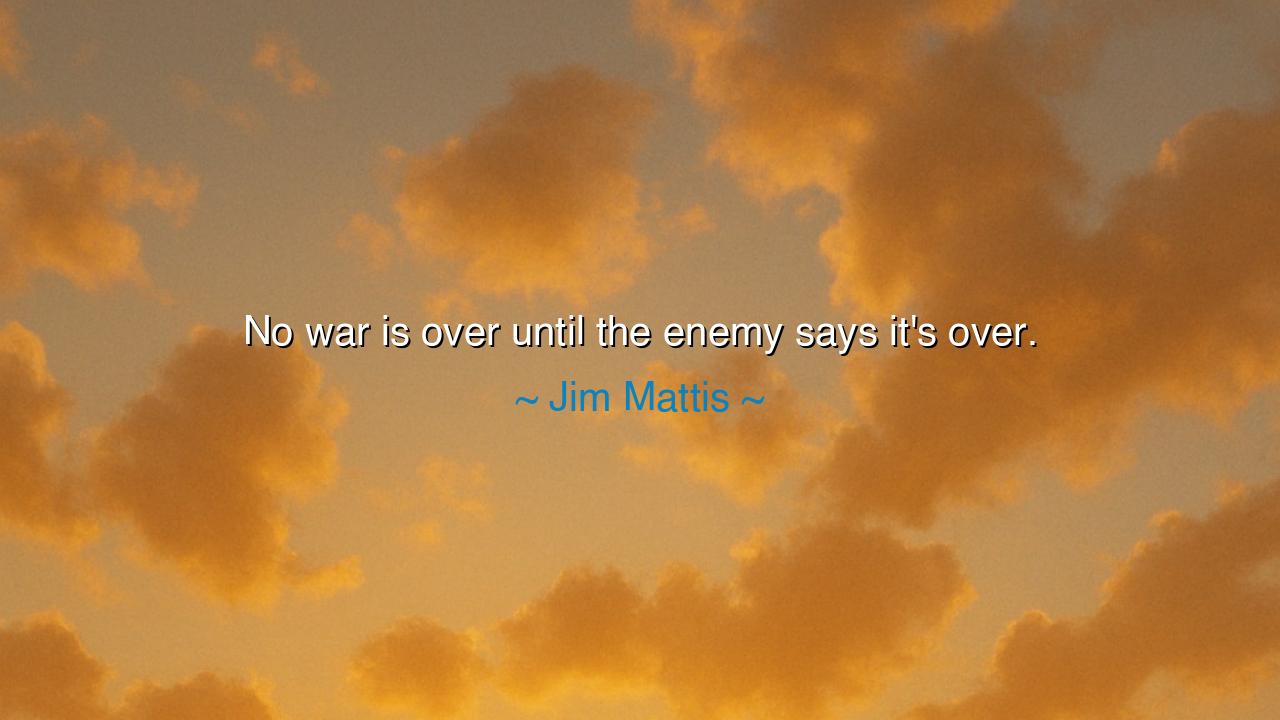
No war is over until the enemy says it's over.






Hear now the words of the warrior, Jim Mattis: “No war is over until the enemy says it’s over.” This is not a saying born from the comfort of books, nor from the idle musings of philosophers, but from the heart of battle itself. It is the hard wisdom of one who has seen the smoke of war and heard the cries of men. It tells us that victory is not declared by the lips of the conqueror, but by the silence of the conquered. For as long as the foe resists, as long as the spirit of defiance smolders in the breast of the enemy, the struggle endures, unseen perhaps, but alive.
This truth is as old as the first clash of tribes. To believe a war ends when one side tires or grows complacent is folly. Many empires have learned this too late. Rome, though mighty, fell not to one great blow but to the persistence of barbarians who would not yield. The Greeks fought the Persians across generations, and even when cities burned, the flame of resistance endured. Thus Mattis reminds us that peace cannot be claimed by proclamation alone; it must be recognized by those once opposed, for only then is the contest truly laid to rest.
Consider the tale of Vietnam. The great power of the United States believed it could bring the war to conclusion by force of arms and the might of industry. Yet, though battles were won on the field, the enemy did not acknowledge defeat. The will of the Viet Cong and North Vietnamese endured like iron beneath fire. So the struggle continued, not only in jungles and rice paddies, but in the hearts of soldiers and the souls of nations. In the end, it was not weapons but the relentless resolve of the enemy that determined when the war would end.
This teaching also warns us of the spirit of unseen wars in our own lives. For are there not battles we think we have finished, yet still linger because the foe within us has not yielded? A man may claim to have conquered his anger, but if resentment yet stirs, the fight remains. A woman may think she has overcome sorrow, but if grief still whispers, the contest continues. The enemy is not only nations or armies; it is also pride, fear, despair, and temptation. And until these adversaries acknowledge their defeat, no inner war is truly ended.
But let us not despair. To endure is the first weapon. The lesson of Mattis is not that wars last forever, but that vigilance must be as constant as the sun. Victory requires patience, strength, and wisdom. Just as the seasoned general watches not only the battlefield but also the heart of his foe, so too must we watch our own hearts and the struggles we face. A single declaration of triumph is not enough; true peace comes only when the adversary lays down arms of his own accord.
From this, my children, learn the way of steadfastness. When confronted with trials, do not be hasty in declaring them overcome. Guard your soul, remain watchful, and continue your labor until even the enemy within confesses defeat. In matters of nations, let rulers understand that peace cannot be imposed by force alone; it must be born in the hearts of those once opposed. And in matters of the spirit, let each person learn humility, knowing that battles continue long after the noise of conflict has faded.
Therefore, walk the path of patient vigilance. Strengthen your mind with discipline, your heart with courage, and your hand with mercy. Support those who struggle, for their wars may be unseen. Build peace not by declaring it, but by living it until even the most stubborn adversary is disarmed. Only then shall the words of Mattis be fulfilled, and the true end of the war be known.






PVAn Phu Vo
The quote from Mattis makes me think about the nature of conflict itself. Is war ever really over when one side has been defeated, or does it just shift into another form of conflict, like cold war or economic warfare? Can a war truly end if there is no true reconciliation between the sides?
QDTa quang dang
It’s intriguing that Mattis points out how the end of war is in the hands of the enemy. Does this suggest that the true test of victory lies in convincing the other side to concede? And how does this impact peace negotiations—should both sides be equally committed to peace for it to truly hold?
TMTien Minh
Mattis' perspective brings to mind how wars are often prolonged by pride, resources, or political agendas. What do you think about the idea that the formal end of war isn’t just based on the battlefield, but on psychological and political factors too? How much does diplomacy play into the actual end of a war?
NYTran Nhu Y
This quote from Mattis seems to highlight the importance of recognizing the enemy's perspective. In wars, it’s not enough for one side to declare peace—there has to be mutual acknowledgment. Does this mean that the true end of a war comes only when both parties agree to it? Or can a war end unilaterally when one side can no longer fight?
QNquang nhat
Jim Mattis' quote underscores the complexity of conflict—how even when one side feels like the war is over, it might still rage on for the other. It makes me wonder, what does ‘victory’ truly mean in the context of war? Is it really determined by the side that gives up first, or is it more about the lasting consequences of the war itself?